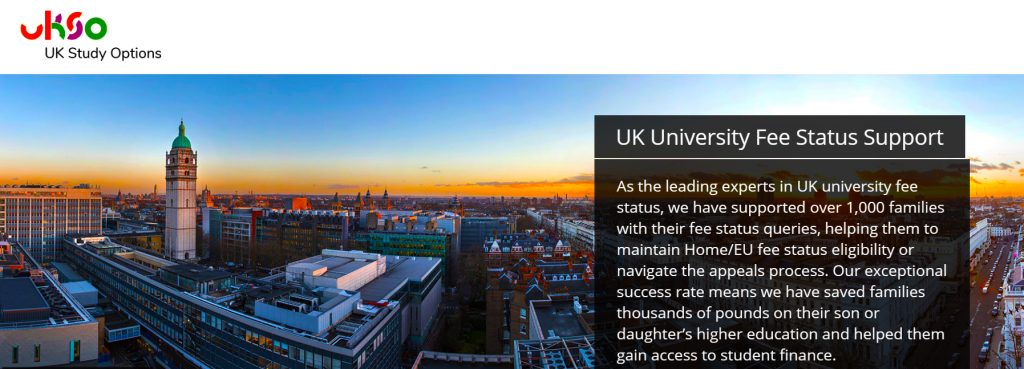Free help to significantly lower the costs of University Fees in the UK for parents living in the UAE. How to Save Up to £350,000/AED 1.6M. Proving Home Fees Status. The Guide.
Background: NEW Free help for potentially lowering the costs of UK University Fees for parents living in the UAE. How to Save Up to £350,000/AED 1.6M. Proving Home Fees Status. The Guide.
Ask British families based in the UAE what worries them most and at some point the issue of paying university fees in the UK will be top of the list.
For many families, the costs for their children to study at UK universities are prohibitive – and the financial impacts can be catastrophic. If families cannot secure “home fee status”, in many cases this means that their child will simply not be able to study for a degree in the UK at all.
With international fees for degrees in Medicine at Oxbridge topping £350,000, and even classroom-based degrees in the Arts at top universities reaching £100,000, little wonder that the costs of getting children places at UK universities frightens even the wealthiest families.
In this article we look at the issues, explain how to secure Home Fee Status – and provide advice on where to turn if it all goes wrong and your child is categorised as an overseas student facing full international fees. We include below a link for an entirely free provisional analysis of whether families are likely to be accepted for Home Fee status – and what is required to achieve this.
What is home school fee status?
When students apply to British universities they are categorised by universities as either:
- Home fee students
- International students
Home fee student fees are subsidised by the British government using taxpayers’ money. International students receive no subsidy and pay full fees.
Why does it matter? International students pay between £15,000 and £350,000 more than home fee students over the lifetime of a degree – for the same degree.
Will I Be Categorised as a Home Fees Student or an International Student?
To determine whether a student receives home fee status and subsidised fees, universities carry out a fee status assessment. Universities all interpret the rules established by UKISA for which students are awarded home fee status differently. Many students will be offered home schools status by some universities and international fee status by others – all for the identical course.
As a rule, the more competitive the course and the more prestigious the university, the stricter the universities are in how they interpret the rules and the less likely it is to receive home school status for fees. The least expensive fees in the UK are available at Scottish universities which are also known to be strict in how they decide whether a student is awarded home fee status.
The Further Negative Impacts of Not Being Awarded Home Fee Status
There are three further impacts faced by families who do not achieve home school status:
- Overseas students have no right of access to student finance.
- Many universities cap the number of places available to international students. It can be much harder to get into a university, particularly for heavily NHS subsidised courses like Medicine, Veterinary Science, Nursing, Clinical Psychology and Dentistry. In some cases, only 2% of places for a course are made available to international students.
- Worsening outlook. The situation is only going to get worse for international students. First, the UK is moving towards a points-based immigration service. Second, European students may no longer be classified as home students after Brexit. Third, pressure is mounting for universities to charge even more for international students. International students are increasingly seen as cash cows for UK universities. Fourth, grade inflation, as a result of students being awarded teacher-assessed grades during Covid 19, has resulted in universities being oversubscribed. This may lead to UK universities reducing the number of places available to international students in 2021.
How do I Prove Home Student Fee Status?
You need to prove that you should be awarded home fee status. UKCISA.
The basic rules are that students and their families must be:
- Entitled to live in the UK without restriction;
- “Ordinarily resident in the UK”;
- Be able to demonstrate strong connections with the UK;
- Be only “temporarily resident outside the UK”; and,
- be able to prove (1) to (4)
Different universities are stricter than others in interpreting these rules.
When you apply to a university you will get a Fee Status Questionnaire. This will decide how you are classified. Each university has a different form, with different questions and different ways of deciding what status to award. The only constant is that you must complete this form very carefully and you need to prove in every case that you have a “regular habitual mode of life in the UK.”
In practice this means that you must prove, and preserve, “ordinary residence in the UK for at least three years prior to applying to university.” For many families in Dubai this may seem to spell disaster.
However, you can still be classified as ordinarily resident in the UK whilst living in the UAE at the same time. But you must show that you do not currently permanently reside in the UAE. Most British families in the UAE are refused home fee status on this ground. The clock starts ticking on three years on 1st September three years before you are seeking access to start studying at university for entrance to universities in England, Wales and Northern Ireland. In Scotland it is the 1st August.
You lose, weaken, or jeopardise your eligibility for home fee status if you do not maintain links with the UK to prove a “regular life in the UK” and collect evidence of this.
You do not need to have a British passport to secure home fee status. But, you must have met the immigration requirements. You can get a right of permanent residence if you have lived in the UK for more than 5 years.
You must show that you are temporarily absent from the UK. This is interpreted differently by universities – but one way of proving this is if you are working on a time limited rather than permanent contract. However, many students are refused home fee status because their parents have been working on a succession of temporary contracts over a long period. The longer you are away from the UK, the harder it is to argue that you are away from the UK temporarily.
Going to boarding school for the three years prior to applying to university will not work in isolation to prove home fee status and being ordinarily resident in the UK in itself, although it may help.

Numerous boarding options are available in the UK, here pictured boarders studying at Cheltenham Ladies College. But it won’t in itself prove home school status for fees.
The question university’s ask is: “If you were not at a UK boarding school, where would you be living.” If your answer is in the UAE with my family, and not in the UK, (as most UAE families would answer) then you will not meet the requirement for ordinary residence. The main purpose of being in the UK cannot be studying.
Comparing the Cost of Home Fee Status Student Fees and International Student Fees
A. Home Student Fees
The fixed cost of studying for all Home Fee Students at any university for any course in England is £9,250 per year.
The fixed cost of studying for all Home Fee Students at any university for any course in Northern Ireland is either £4530 per year if you are a Northern Ireland National or £9,250 per year for other UK students.
The fixed cost of studying for all Home Fee Students at any university for any course in Wales is £9,000 per year.
The fixed cost of studying for all Home Fee Students at any university for any course in Scotland is either just £1,820 per year for Scottish Nationals or £9,250 per year. Scottish degrees are generally studied over four years, rather than the three years required in other parts of the UK.
B. International Student Fees
Overseas, international student fees vary depending on the course and university.
The cost of degrees varies according to its classification.
For classroom-based degrees (for example the Humanities, Arts and Social Sciences) international student fees range from £12,000 to £30,000 per year.
For labs-based degrees (for example, Physics, Chemistry, Engineering and Biology), international student fees range from £19,000 to £39,000 per year.
For clinical courses (including Medicine, Veterinary Medicine and Dentistry), international student fees range from £28,000 to £58,000 per year. These can be five or six year courses.
Oxbridge also charge College fees on top of these fees for overseas students. These are £10,000 per year.
You can compare international fees on The Reddin Survey. This includes all the fees for every course and university in the UK and allows you to see what universities are charging for each course. The Reddin Survey can be downloaded in Excel Format here. (Thank you to the Good Universities Guide for providing us with this information.)
Student Loans? In Hard Cases do NOT Apply.
International students cannot access student loans.
Even if you are classified as a home student by a university, the student loans/finance companies may disagree. You will have to undergo a different Fee Status Assessment for the student loans/finance companies. You cannot rely on the decision made by universities to determine the outcome. Student finance companies are, as a rule, stricter.
In difficult borderline cases, it is not recommended applying to the student finance companies for a loan as they could, theoretically, ask Universities to re-consider their Home Fee Student decision. This could jeopardise home fee status.
Top Tips to Secure Home Fee Status
- Regularly visit family in the UK, particularly grandparents. Retain all tickets and proof of visits over the longest period possible and for a minimum of three years. This is the single most powerful evidence you can provide. It is vital to regularly visit the UK and retain evidence. If you can visit multiple times each year that is better. Do not miss a year.
- Own a property in the UK over a minimum of three years to prove a consistent base home in the UK. Have proof that you have regularly visited your home every year.
- Work for a UK company and be on an expat temporary contract. Try not to be on a very long succession of temporary contracts.
- Apply for less competitive courses and universities.
- Register for, and pay, Council Tax in the UK for the longest period possible and a minimum of three years. This will support, for example, application from students who are at boarding school in the UK.
- Do not leave it too late to start collecting evidence. The evidence needs to be collected for a minimum of three years prior to starting university. You cannot collect too much, it cannot be too detailed and you cannot start too soon. Collect every receipt, ticket and email. Some universities look not just at three years, but at the whole lifetime of a student.
- Do not, ideally, be out of the UK for longer than five years for the most competitive courses and universities.
- Expect to submit personal evidence including tax records, bank statements and personal statements reflecting family circumstances to prove your home in the UK.
- Be prepared to appeal.
- Always have an insurance offer and do not give it up until you have confirmed home Fee Status from your first-choice university.
- British Nationality and a British Passport help – but provides no guarantees.
Where to Get the Facts? Free Report for Parents on whether they have a chance of securing Home Fees – and what they need to do.
The rules that universities base their decisions on in deciding whether to award Home Fee Status are decided by UKISA. The key information can be found here.
The information here is particularly important if you find yourself needing to find grounds for Appeal.
Further Help if You Face Disaster – Fire Fighting Appeals
It is rare that we directly recommend an organisation. In this case however, one organisation, UK Study Options, does have extensive experience of fighting appeals. They offer help to parents in finding grounds of appeals and will help parents and students navigate the Appeals Process.
UK Study Options is an organisation run by Ex Russell Group Admission Officers with backgrounds drawn from Birmingham, Imperial, Cranfield and Warwick. They are the only independent advisers on fee status in the world and have an 11-year track record of helping thousands of families worldwide secure home school status, even when they have been rejected for home fees by universities.
They will also help families submit original applications for Home Fee status to avoid the pitfalls.
The cost for a Fee Status Appraisal is a fixed fee of £280/AED1342. In non-appeal cases this is usually sufficient.
However, in 2023 the organisation is now providing an initial 100% free review of fee status for families. This can be accessed by completing this online form. This will provide a basic analysis of whether it is possible to meet the thresholds for obtaining Home fees.
The cost for supporting an Appeal and/or ongoing assistance is an additional £200 per hour.
The highest historical cost of a complex appeal required a Fee Status Appraisal (£280/AED1342) and a total of 20 hours of support (£4,000/AED19,200). This involved completely outsourcing the Appeal. The total cost paid by the family was £4,280/AED20,542. The appeal was successful and saved the family tens of thousands of pounds/dirhams after the Appeal Fees.
UK Study Options have an approximate 90% success rate for Appeals, all of which are by definition complex.
Contact Kate Raison, Director, UK Study Options at [email protected]./+44 208 187 1865 (Land)/+44 7841 592859(Cell)
Bottom line? The SchoolsCompared Guide to Accessing Home Fee Status 2022
The best courses and best universities are the strictest on Home Fee Status – and the most expensive. Always include an application to fall-back universities and courses if you are not going to be able to afford international fees.
Never, ever give up a back-up offer until home-fee status is confirmed in writing by your chosen first choice university. Your first-choice university has no reason to award Home Fee Status if you do not have an alternative. British universities today work very much like businesses; they look to international students to meet their revenue targets.
The best schools in the UAE have in-house expertise on guiding families on how to access home-fee status. Ask your school for support and information as soon as possible – do not wait until Sixth Form.
Our top three pieces of advice in summary are:
Collect evidence of links to the UK, and start now. Travel home every year, and multiple times, if you can (albeit that the Covid-19 pandemic continues to make this difficult).
If you are facing catastrophe, or need informed urgent help contact UK Study Options. They will help. Details above on access to a free report on the potential to secure home fees.
Always Appeal International Student status, but do so only after you have understood what you need to produce to ensure the highest chance of success.
Bottom line? This issue can skewer the life chances of children and financially ruin families – but, positively, it is rarely insurmountable if the right action is taken at the right time.
You are not alone. The worries caused by home fee status give sleepless nights, and often worse, to the majority of parents of Sixth Form age children in the UAE. Never be worried about asking for help – it is there.
In even the most frightening cases, when all seems lost, there are usually ways through.
©SchoolsCompared.com 2023. All rights reserved.
Note
Thank you to GEMS FirstPoint School in Dubai for their help in producing this article for parents. Our review of GEMS FirstPoint School can be found here.





























































Leave a Response